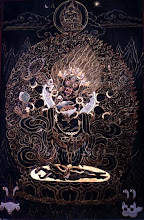Retracing the history of the 20th century through the lens of psychology, British documentarian Adam Curtis leads the viewer in The Century of the Self on a journey into the methods developed to manipulate public opinion. Make no mistake. Curtis is not spinning a conspiracy theory. There are no aliens, no Jewish cabal, no Templars. Only doctors, scientists, businessmen and politicians who thought Sigmund Freud's ideas about the hidden urges of the subconscious might be used to control large groups of people and thereby make a better world.
 The story begins with Freud's nephew, Edward Bernays, who launched his American career selling Woodrow Wilson to the Europeans before setting himself up in the business of what he called Public Relations, the world's first professional marketing agent. Until his arrival, advertising was based on rational appeal, to the utility of the product being sold. But in an economy where industry was already meeting the basic needs of the people, how were businesses to continue to increase profits if consumers didn't buy more (of what they didn't need)? Bernays' genius was to help his clients create demand through advertising appealing to the consumer's unconscious desires.
The story begins with Freud's nephew, Edward Bernays, who launched his American career selling Woodrow Wilson to the Europeans before setting himself up in the business of what he called Public Relations, the world's first professional marketing agent. Until his arrival, advertising was based on rational appeal, to the utility of the product being sold. But in an economy where industry was already meeting the basic needs of the people, how were businesses to continue to increase profits if consumers didn't buy more (of what they didn't need)? Bernays' genius was to help his clients create demand through advertising appealing to the consumer's unconscious desires.The need to plumb these appetites and redirect them became urgent in the threatening shadows of Fascist and Communist ideologies. But with greater control came a greater degree of awareness of the methods of manipulation by the public. The push-back came in the 1960's in the form of political dissent and open challenges to established authority. After episodes of these were forcibly suppressed (as at the Chicago Democratic Convention and at Kent State), resistance turned inward, to a philosophy of liberating the self from state control through experiments with drugs, eastern religions, and new forms of psychotherapy.
Corporations were for a time unable to reach this segment of the population until surveys revealed their hidden desire - to be different, to stand out from the crowd, to express their individuality. And so the corporations learned to adjust manufacturing methods to produce a wider variety of the same type of goods.
By late century techniques for mining the unconscious had moved into the electoral process with campaign managers noticing and responding to the same underlying desire of the consumer to express his individuality. The successful candidates – Reagan, Thatcher, Clinton, Blair – were the ones who responded to this need most skillfully. In the years since politics has become less rational and more emotional, politicians less philosophical statesmen and more opportunistic businessmen.
Curtis brings a number of strengths to this project, including a sharp eye for detail, evident in the breadth of archival footage employed, and the ability to connect the dots thematically and visually. His collage technique builds meaning out of relationship and weaves a compelling narrative from disparate threads of seemingly unrelated events, all narrated in his own voice of reassuring authority. Of course he wouldn't be much of a filmmaker if he didn't apply a bit of his own subconscious manipulation, most clumsily telegraphed in his overuse of dark and forbidding background music. Otherwise, there's not much in these four hours with which to find fault.
Watch it yourself and see if you don't see some part of your own ideas or behavior reflected back at you. The complete series is available as of this writing at Google Video.
#



























0 comments:
Post a Comment